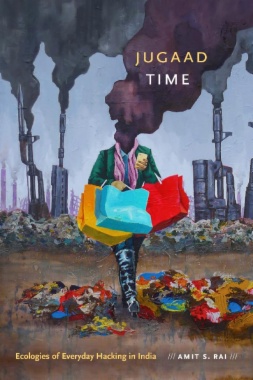In India, the practice of jugaad—finding workarounds or hacks to solve problems—emerged out of subaltern strategies of negotiating poverty, discrimination, and violence but is now celebrated in management literature as a disruptive innovation. In Jugaad Time Amit S. Rai explores how jugaad operates within contemporary Indian digital media cultures through the use of the mobile phone. Rai shows that despite being co-opted by capitalism to extract free creative labor from the workforce, jugaad is simultaneously a practice of everyday resistance, as workers and communities employ hacks to oppose corporate, caste, and gender power. Locating the tensions surrounding jugaad—as both premodern and postdigital, innovative and oppressive—Rai maps how jugaad can be used to undermine neoliberal capitalist media ecologies and nationalist politics.
- Cover
- Contents
- Preface
- Acknowledgments
- Introduction. A Political Ecology of Jugaad
- Fables of the Reinvention I:
Toward a Universal History of Hacking
- 1.
The Affect of Jugaad: “Frugal Innovation” and the Workaround Ecologies of Postcolonial Practice
- 2.
Neoliberal Assemblages of Perception and Digital Media in India
- Fables of the Reinvention II:
New Desiring Machines
- 3.
Jugaad Ecologies of Social Reproduction
- 4.
Diagramming Affect: Smart Cities and Plasticity in India’s Informal Economy
- Fables of the Reinvention III:
A Series of Minor Events
- Conclusion. Jugaad Jugaading:
Time, Language, Misogyny in Hacking Ecologies
- Notes
- References
- Index
- A
- B
- C
- D
- E
- F
- G
- H
- I
- J
- L
- M
- N
- O
- P
- R
- S
- T
- U
- V
- W

